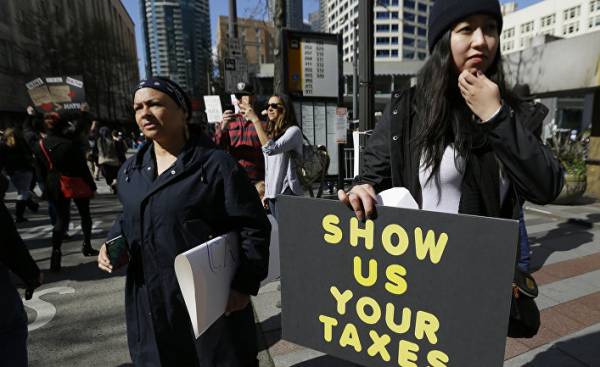
NEW YORK — Although the right-wing plutocrats of America may not agree with how to classify the basic problems of the country — for example, inequality, slow growth, low productivity, opioid dependence, poor schools and deteriorating infrastructure — the solution is always the same: tax cuts and deregulation to “encourage” investors and the “free” economy. President Donald trump is counting on this package to make America great again.
This will not happen, because it never happened. When President Ronald Reagan tried to do in the 1980-ies, he argued that this will increase tax revenues. Instead, growth slowed, tax revenues have declined, and workers have suffered. The big winners in relative terms, steel corporations and the rich, who have benefited from significantly reduced tax rates.
Trump has yet to put forward a specific tax proposal. But, in contrast to the approach of his administration to the legislation in the field of health, a lack of transparency will not help him. Although many of the 32 million people who are projected to lose health insurance under the current proposals still do not know what will happen, this does not apply to companies that are at a disadvantage from the tax reform trump.
Here’s the dilemma trump. His tax reform should be neutral in relation to income. It is a political imperative: corporations sitting on trillions of dollars in cash, while ordinary Americans suffer, lowering the average corporate tax would be outrageous — and even more if they reduced taxes for the financial sector, which led to the 2008 crisis and never had to pay for economic damage. Moreover, the procedures of the Senate dictate that the adoption of the tax reform with a simple majority, not three-fifths of superbalita required to defeat almost sure filibusteros opposition of Democrats, the reform should be budget neutral within ten years.
This requirement means that the average income from corporate tax should remain unchanged, which means that there will be winners and losers: some will pay less than now, while others will pay more. Some of it can get away with, in the case of personal income tax, because even if a losing note, they are not well organized. On the other hand, even small business in the USA lobbies Congress.
Most economists would agree that the current tax structure of America is ineffective and unfair. Some firms pay a much higher rate than others. Perhaps innovative firms that create jobs should be rewarded, particularly tax incentives. But the only reason or explanation for those who receive tax benefits, apparently, is the effectiveness of lobbyists asylum.
One of the most significant problems is the taxes received from overseas income of U.S. corporations. The Democrats believe that, as American corporations, regardless of their place of activities, used the rule of law and America’s power to ensure (often guaranteed by Treaty) that they are illegal, they should pay for these and other benefits. But the sense of justice and mutual aid, and especially national loyalty, not deeply embedded in many American companies, which respond with threats to move their headquarters abroad.
The Republicans, in part because of sensitivity to this threat, in favor of a territorial tax system, as it is used in most countries: taxes should be imposed on economic activities only in the country where it occurs. The worrying fact that after the introduction of the lump-sum collecting untaxed income that American firms keep abroad, the introduction of the territorial system will lead to tax losses.
To compensate, the speaker of the U.S. house of representatives, Paul Ryan, has proposed adding a tax on net imports (imports minus exports). Because net imports leads to a reduction in jobs, it should be discouraged. At the same time, as long as the volume of net imports in the United States will be as high as it is now, the tax will bring huge profits.
But there’s a catch: the money must come from someone’s pocket. Import prices will go up. Consumers of cheap clothing from China will be in a worse position. For team trump is collateral damage, the inevitable price that must be paid to give the plutocrats of America more money. But retailers such as Walmart, and not only his customers, are also part of collateral damage. Walmart knows this and will not allow it.
Other reforms to corporate taxation might make sense; but they also suggest winners and losers. And while the losers are the majority, and they are quite organized, most likely they will be able to stop the reform.
Politically astute President who deeply understands Economics and politics of corporate tax reform could expand the Congress to the package of reforms that make sense. Trump is not the leader. If corporate tax reform ever happens, it will be a mishmash agreed upon behind closed doors. Most likely the widespread tax cuts: the losers will be future generations, not today’s lobbied by greedy tycoons, the most greedy of which are those who owe their dirty activities such as gambling.
The wretchedness of all this will be mitigated long-standing assertion that lower tax rates will stimulate growth. To do this, there is simply no theoretical or empirical basis, especially in countries such as the US, where most of the investments (in the limit) is financed by debt and interest are not taxed. Marginal revenue and marginal costs decrease proportionally, leaving investments as a whole without changes. In fact, a more detailed analysis, taking into account accelerated depreciation and the impact on risk distribution shows that the reduction in tax rates, apparently, will lead to lower investment.
Small countries are the only exception, because they can pursue a policy of “beggar-thy-neighbor” aimed at enticing corporations from their neighbors. But global growth remained almost unchanged — distribution effects are actually kind of gets it, because one wins at the expense of another. (And this assumes that the other is not responsible, and encourages a “race to the bottom”.)
In a country with so many problems — especially inequality — reducing taxes for the rich corporations will not solve any of them. This is a lesson for all countries considering the issue of corporate tax breaks — even those who escaped the misfortune to be governed by inexperienced, cowardly plutocrat.







